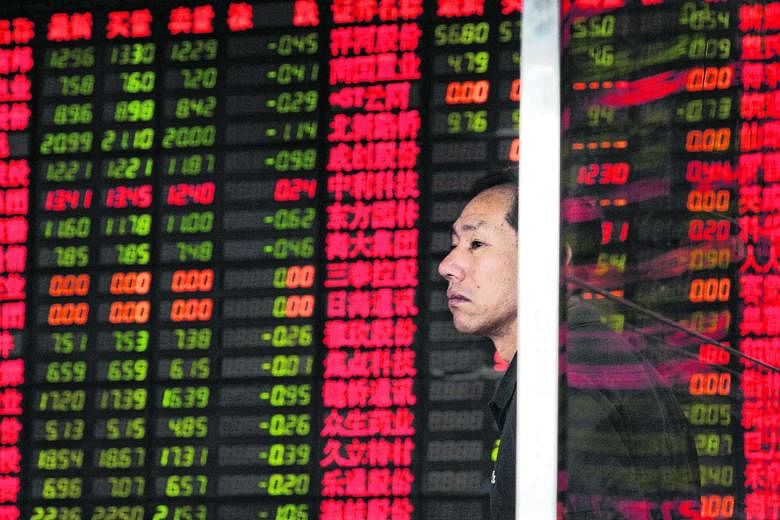SYDNEY (Bloomberg) - Bruce Yu needs a time out.
Like investors around the world, the Franklin Templeton SinoAm money manager has struggled to keep up with escalating volatility in Chinese markets - swings that increasingly set the tone for trading in everything from commodities to U.S. stocks and the Japanese yen.
Luckily for Mr Yu, China is shutting down its exchanges and banks until Monday to commemorate the 70th anniversary of Japan's World War II defeat. The yuan also stopped trading at 4:30 pm in onshore markets. No major economic data is scheduled until Tuesday, when August trade figures will be announced.
The holiday gives global investors four days without any price swings or scheduled data releases from the world's second-largest economy.
"Most fund managers are battered and close to desperate" for relief from the turmoil, said Mr Yu, who runs the Franklin Templeton SinoAm China A Shares Equity Fund in Taipei. The holiday "is a good time to clear your thoughts and prepare for what comes next. Hopefully global market volatility will drop."
China has rattled world markets over the past two months with a shock devaluation of the yuan, an opaque approach to stock-market intervention and a string of economic data signaling weak growth. The three biggest daily declines in the MSCI All-Country World Index over the past month were triggered in part by news out of China, according to data compiled by Bloomberg.
The MSCI All-Country World index sank 2.7 per cent on Tuesday after a gauge of Chinese manufacturing fell to a three-year low. An 8.5 per cent plunge by the Shanghai Composite on Aug 24 spurred the biggest drop in global shares since 2011. Emerging-market stocks and currencies tumbled last month in the wake of China's largest currency depreciation since 1994.
Price swings in the Shanghai Composite Index surged to the highest level since 1997 last month, while the Chicago Board Options Volatility Index - known as the VIX- jumped the most since at least 1990 in August. Swings in the Bloomberg Commodity Index over the past 30 days are near the highest in three years.
Gauges of price swings fell on Japan's Nikkei 225 Stock Average and South Korea's Kospi on Thursday, after the VIX declined the most in seven weeks on Wednesday.
Of course, investors can still bet on Chinese securities in offshore markets during the local holiday. Those include US - listed shares of mainland companies, equity-index futures in Singapore and the offshore yuan in Hong Kong, where exchanges are shut Thursday but reopen Friday.
Just because mainland markets are closed, it doesn't mean global investors can forget about China, said Dai Ming, a money manager at Hengsheng Asset Management Co. in Shanghai.
President Xi Jinping will give a speech on Thursday before the start of China's World War II parade, which the government will use to demonstrate its rising military and political might. Authorities have also been known to announce policy changes, including interest-rate cuts, over the weekend.
"A two-day closure isn't much of a relief," Mr Dai said.
Investors will also be focused on what happens in the US, where monthly payroll figures due Friday will fuel the debate over the likely timing of the Federal Reserve's first interest- rate increase since 2006. The Standard & Poor's 500 Index sank 3 per cent on Tuesday, before rebounding 1.8 per cent on Wednesday.
"The US market is much larger and much consequential," said Timothy Moe, the chief Asia Pacific strategist at Goldman Sachs Group Inc.
But China's impact on the rest of the world has been increasing as its economy and financial markets expand. The nation accounted for 38 per cent of global growth last year, up from 23 per cent in 2010, according to Morgan Stanley. Its stock market is the second-largest after the US, while the yuan ranks third behind the dollar and euro in terms of trade finance, according to the International Monetary Fund.
For Andrew Clarke, director of trading at Mirabaud Asia Ltd. in Hong Kong, the holiday offers a break from the all the "noise" created by China's market swings.
"It should be nice and quiet," said Mr Clarke, who will be working over the break to trade in Japanese and South Korean markets. "I'm looking forward to catching up on some reading."

